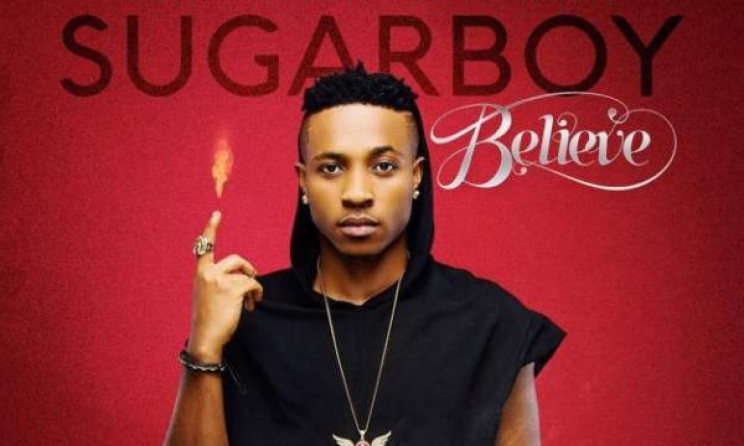Sugarboy – Believe
Artist: Sugarboy
Album: Believe
Label, Year: G Worldwide, 2017
 Cover art for Sugarboy's Believe
Cover art for Sugarboy's Believe
Last time the record label G Worldwide put out a record it resounded commercially and critically. That album was Kiss Daniel’s New Era. The title declared its intentions. Even its unreleased singles were played widely. It led to Kiss Daniel winning three Headies.
G Worldwide has now released Believe from Sugarboy. If as with New Era an album’s title is its destiny, then it is unclear what to make of this one. Are we asked to believe in the artist? Are we to believe in the album? If so, to what end?
In any case, Sugarboy’s debut opens with ‘Stunt Gidi’, a song about Lagos, its heavy traffic, the aspiration of its residents, and the city’s swagger. The song’s production makes an announcement of its contents. This is an event, it seems to say. But it is just an intro. The tempo hardly increases on the next song, ‘Neighbour’. But a major concern of Sugarboy does come up: From here onward women and money become a preoccupation. What’s a young man to do?
The previously released ‘Double’ follows ‘Neighbour’ and combines the hustle for money with the Nigerian love of God. It is a tried method of Nigerian pop: Perhaps the most successful of contemporary pop songs with this combination is Korede Bello’s ‘God Win’. Bello’s song swept the country with its astute mix of God worship, bank payments and dance-ready beat. That scale of success was never going to happen for ‘Double’, mainly because of its slower tempo. Still it got some airplay. Indeed, the generally tepid tempo of much of Believe already means that as a whole it hardly has a future in the clubs. On the other hand, its bid for wedding airplay, ‘Dada Omo’, will not dislodge any major song from the Nigerian canon of matrimonial music.
Believe‘s chances at vast commercial success could have been predicted during its production: in terms of beats, it falls somewhere between the speedy tracks of acts like Lil Kesh, Tekno and Wizkid, it isn’t quite as slow or as lazily ‘vibey’ as the tracks of Mr Eazi, YCee or Maleek Berry, and it isn’t madly esoteric as the work of Jesse Jagz. So it is hard to know where to place the music, something necessary in selling pop music.
The added baggage is Sugarboy’s reggae leaning, as demonstrated on ‘Know’, a throwback to an age not many young people are particularly keen on. He may be unusual but he isn’t unusual enough. And across the album, he uses phrases and melodies recalling reggae-dancehall acts as varied as Snow (on ‘Informa'), Timaya and Kranium (on ‘Neighbour’), UB 40 and/or Lucky Dube (on ‘Love You’) and Brick & Lace (on ‘Wicked’). It does nothing for an artist’s belief in his own uniqueness to sprinkle pop references, and not very cleverly, throughout his first work. The album’s true successes come when pop and dancehall mix, as occurs on ‘Kilamity’ with Kiss Daniel and ‘Legalize’, where somehow Sugarboy extracts a delight from repeating ‘legalise’, a word with no discernible meaning on the song.
There are only a few pure failures on Believe; its major flaw is the blur of monotony in the middle and the album’s endless length (it is 22 songs and 77 minutes long). But there are a number of worthy tracks. Older songs ‘Legalize’, ‘Holla Holla’, and ‘Kilamity’ work still. New ones like ‘Mad’, ‘Jofunmi’ and ‘Ekene’ featuring Kiss Daniel have some replay value.
If the title is asking for belief in the album, then it is too much to ask. Unless truly special, no album over an hour can demand the suspension of disbelief. What Sugarboy’s Believe needs is massive promotion from the record label and tolerance from its listeners.



























Commentaires
s'identifier or register to post comments